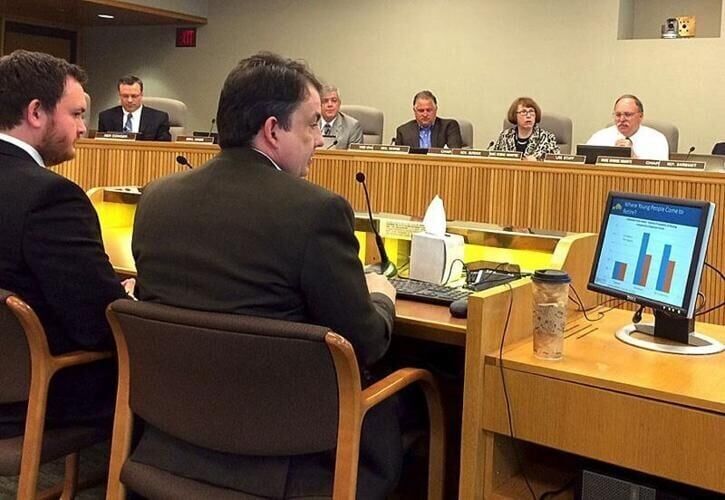Capital chatter: Say goodbye to the state economist who is ‘always wrong’
Published 5:00 am Wednesday, June 5, 2024

- State Economist Mark McMullen, right, and Senior Economist Josh Lehner brief state lawmakers in 2020.
Six years ago, State Economist Mark McMullen was presenting Oregon’s quarterly economic and revenue forecasts when state House Revenue Committee chair Phil Barnhart, D-Eugene, said: “I think you just said that you’re almost always wrong. Did I get that right?”
McMullen responded: “Not ‘almost,’ Chair Barnhart, always wrong. Just a matter of degree.”
Such is the life of the economist whose calculations determine the size of Oregon’s state budget.
After a dozen years of always being wrong, McMullen headed out the state government door and joined Common Sense Institute Oregon as vice president for policy and research.
Some political insiders have grumbled that the state Office of Economic Analysis, which McMullen headed, has been too conservative in forecasting revenues, thus causing enormous income tax “kicker” refunds for taxpayers instead of money being spent on state services and schools.
McMullen said no one pushed him out the door. He had initially declined the Common Sense Institute’s overtures. When recruited again on what he called “a particularly vulnerable day,” he thought, “Why not give it a shot?”
The Common Sense Institute expanded into Oregon this year as its fourth state, joining Colorado, Arizona and Iowa. The organization already has produced several reports, including the Oregon Public Safety Competitiveness Index last week.
At the Common Sense Institute, McMullen said, he’ll still be providing objective economic analysis but on a broad range of hot-button issues — ballot measures, housing, homelessness, public safety and others.
It seemed fitting that his 55th and final set of state forecasts predicted yet another income tax kicker.
A provision unique to Oregon, the kicker makes life miserable for economists, frustrates advocates who want to spend more, and gratifies folks who want to limit government spending.
Every two years, the Office of Economic Analysis must estimate how much revenue — primarily personal income taxes — the state will receive for the general fund. If revenues top that forecast by more than 2%, all money above the predicted amount is “kicked” back to taxpayers as an income tax refund.
Such a precise, long-range calculation is almost impossible. “I don’t think any state economist is a huge fan of having the 2% target,” McMullen said.
But there is a benefit. It forces Oregon not to copy those states whose economists lowball their revenue projections, so as to look good when more money comes in than expected.
“I know we’re always wrong. You can never be right with a forecast,” McMullen reiterated after he and Senior Economist Josh Lehner, now the acting state economist, met recently with the House and Senate revenue committees. “But at least policymakers in Oregon are getting our best guess.”
Most states deal with competing revenue forecasts from the governor’s staff, Legislature, universities and other sources. Politicians then haggle over which numbers are right.
In Oregon, the Office of Economic Analysis is the only game in town. McMullen said it’s essential that the forecasts are objective, and that they be recognized as such. During speaking engagements, he jokes that policymakers don’t care whether he’s competent, only that he’s objective.
Producing each set of economic and revenue forecasts is a monthlong process that involves state and national data, lots of mathematical modeling and discussions with advisory groups.
The wild card can be human behavior. Because Oregon is such a small state, financial shifts involving a few big personal or corporate taxpayers can dramatically affect state revenues.
But wait, there’s more! The Office of Economic Analysis’ duties have expanded to include predictions and analyses on state demographics, public defenders, the lottery, prison and Oregon Youth Authority projections, clean fuels, marijuana, highway costs, housing needs, etc.
It’s no wonder McMullen says his job never is boring.
Not to mention the always-changing geopolitical landscape that economists must factor into their predictions.
Amid all that, McMullen must clearly — and patiently — explain the economic picture to politicians. He is aided by a lack of ego and a sense of humor. Asked how he communicates complex concepts in simple terms, he quipped, “The trick is I only understand everything at about an eighth-grade level.”
He holds genuine appreciation for the state’s elected leaders. “I really do think Oregonians are lucky as far as policymakers,” he told me. “Regardless of ideology, most of them are very earnest, knowledgeable, trying to do the best for constituents.”
The feeling from legislators is mutual. As he and Lehner ended their presentation several lawmakers said they’d miss McMullen.
He answered, “I’ll miss being here, kinda.”



